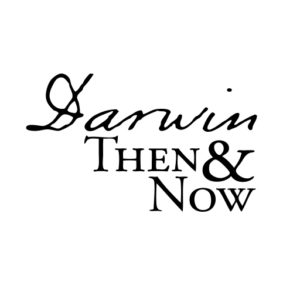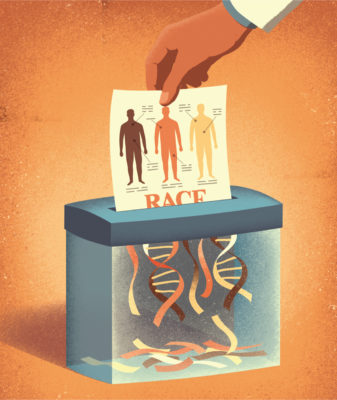 Starting with his infamous book, The Origin of Species (1859), Charles Darwin legitimized racism based on the theory of evolution, albeit briefly. The complete title contains the essential phrase “preservation of favoured races” –
Starting with his infamous book, The Origin of Species (1859), Charles Darwin legitimized racism based on the theory of evolution, albeit briefly. The complete title contains the essential phrase “preservation of favoured races” –
“On the origin of species by means of natural selection, or the preservation of favoured races in the struggle for life”
How his concept of “races” applies to humans was clarified in The Descent of Man (1871). Darwin explains –
“The sole objective of this work is to consider… the value of the differences between the so-called races of man.”
The latest attempt to remove racism from evolution was published this month in the journal Science by the geneticist and leading author Michael Yudell (pictured right) of Drexel University, Philadelphia, in the paper entitled –
“Taking Race Out of Human Genetics”
Long Rough Road
Sociologist and civil rights leader W. E. B., early in the twentieth century. Du Bois (1868-1963) initiated the movement to challenge Darwin’s legitimization of racism. For Du Bois, human race classifications were social, not scientific.
The progressive movement increasingly influenced publishers to incorporate evolution into their biology textbooks. At the same time, lobbyists in state and federal legislatures worked to expand nationwide mandatory public education programs.
In 1914, American writer George William Hunter incorporated evolution into his new biology textbook entitled A Civic Biology. As WIKIPEDIA explains –
“The views espoused in the book about evolution, race, and eugenics were common to American Progressives.”
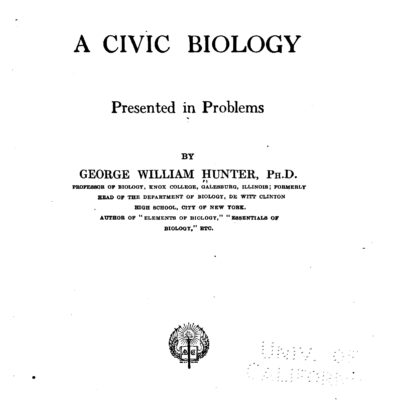 Civic Biology, like many other texts of the time, paraded vestiges as a scientific fact. The New Standard Encyclopedia (1931 Funk & Wagnalls Company) described evolution as “facts from zoology, botany, and geology.” According to Funk & Wagnalls –
Civic Biology, like many other texts of the time, paraded vestiges as a scientific fact. The New Standard Encyclopedia (1931 Funk & Wagnalls Company) described evolution as “facts from zoology, botany, and geology.” According to Funk & Wagnalls –
“[Concerning] the place of man in the evolutionary plan… The vestigial structures show [a] connection with mammals that walked on four feet.”
Evolution, race, and eugenics were scientific facts that were taught. Eugenics, meaning “the production of good offspring,” was adopted by the progressives to engineer a new utopian society, a plan eventually implemented by Nazi Germany. Hunter explains in the section entitled The Races of Man –
“At the present time, there exist upon the earth five races or varieties of man… the highest type of all, the Caucasians, represented by the civilized white inhabitants of Europe and America.”
Under this pretext of science, evolution, race, and eugenics were broadly taught as scientific facts in public education, and Adolf Hitler (1889-1945) operationalized Darwin’s theory, noting – 
“Civilized races of man will almost certainly exterminate and replace throughout the world the savage races.”
Following their humiliating World War I defeat, Germany operationalized Darwin’s racist inheritance theory. The Law for the Prevention of Hereditarily Diseased Offspring gained legal German approval, followed by the Nuremberg Laws in 1935, under the pretext of science to justify “The Holocaust.”
During the Nazi reign, between 10 and 17 million people lost their lives. Removing the stain has been a long and arduous process. As Dan McMillan explains in the Salon article “Hitler, Darwin and the Holocaust: How the Nazis distorted the theory of evolution” –
“First, Darwinist racism explicitly motivated Hitler and many other leading perpetrators of the Holocaust. Second, Darwin inspired the researchers, most notably in biology and anthropology, who gave racism its aura of scientific certainty.”
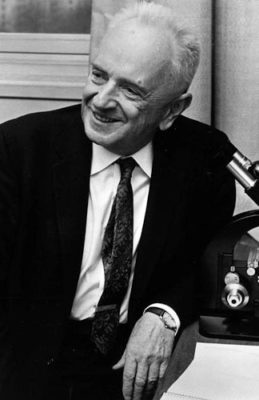 Theodosius Dobzhansky (pictured left), known for his infamous essay Nothing in Biology Makes Sense Except in the Light of Evolution (1973), became increasingly disillusioned with Darwin’s legitimized racism, noting that racism had “floundered in confusion and misunderstanding.” As Yudell explains –
Theodosius Dobzhansky (pictured left), known for his infamous essay Nothing in Biology Makes Sense Except in the Light of Evolution (1973), became increasingly disillusioned with Darwin’s legitimized racism, noting that racism had “floundered in confusion and misunderstanding.” As Yudell explains –
“His [Dobzhansky] transformation from defender to detractor [critic] of the race concept in biology still resonates.”
By the twenty-first century, evidence from the Human Genome Project began uncovering the depths of Darwin’s dilemma regarding racism – human races are a social, not a scientific, construct. As Yudell explains –
“We believe the use of biological concepts of race in human genetic research—so disputed and so mired in confusion—is problematic at best and harmful at worst. It is time for biologists to find a better way.
Megan Gannon, a science writer for the Richard Dawkins Foundation, surprisingly, but takes Darwin legitimized racism to task for legitimizing racism –
“Racial categories are weak proxies for genetic diversity and need to be phased out.”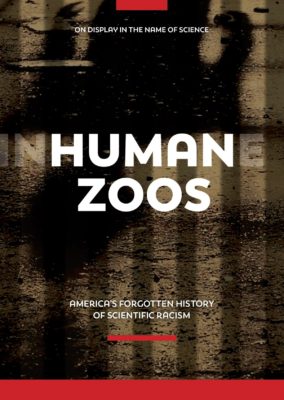
The video, “Human Zoos ” (pictured right), produced by Discovery Science, tells the shocking story of how thousands of indigenous peoples were put on public display in America during the early decades of the twentieth century.
Racial Profiling Complicates Healthcare
Darwin legitimized racism when used as a biological factor in healthcare, which is problematic since race has no scientific or biological basis. “[Ethnic] groups are genetically heterogeneous,” Yudell explains, “and lack clear-cut genetic boundaries.”
Racial profiling in healthcare results in diagnostic errors. Sickle cell disease is not just a “Black” disease, and thalassemia is not just a “Mediterranean” disease. Yudell notes further –
“Cystic fibrosis is under-diagnosed in populations for African ancestry, because it is [erroneously] thought of as a ‘White’ disease.”
 Without biological or genetic scientific evidence for human races, it is a social, not a scientific construct. As Yudell notes, racial classifications –
Without biological or genetic scientific evidence for human races, it is a social, not a scientific construct. As Yudell notes, racial classifications –
“… continue to fuel racist beliefs, so much so that, in September 2014, a group of leading human population geneticists publicly refuted claims about the genetic basis of social differences between races,”
In an interview by Huffington Post, senior science editor Jacqueline Howard (pictured right), in the article “What Scientists Mean When They Say ‘Race’ Is Not Genetic,” Yudell provides a scientific perspective –
“Your race can impact your health, but your genetics is not a good window into how race affects your health.”
Racial Social Constructs
 Nicholas Wade, science writer for the New York Times, is credited with fanning the flames in his latest book entitled A Troubled Inheritance: Genes, Race and Human History. Wade supports Darwin’s legitimized racism, noting that racial differences in economic success between races originate from genetic differences, which are further amplified by culture.
Nicholas Wade, science writer for the New York Times, is credited with fanning the flames in his latest book entitled A Troubled Inheritance: Genes, Race and Human History. Wade supports Darwin’s legitimized racism, noting that racial differences in economic success between races originate from genetic differences, which are further amplified by culture.
Wade’s critics published an open letter in The New York Times Book Review, signed by 144 faculty members in population genetics and evolutionary biology. The letter stated –
“Wade juxtaposes an incomplete and inaccurate account of our research on human genetics differences with speculation that recent natural selection has led to worldwide differences in I.Q. test results, political institutions, and economic development… We are in full agreement that there is no support from the field of population genetics for Wade’s conjectures.”
Countering Darwin’s racist assertions in his Descent of Man, Yudell concludes –
“Historical racial categories that are treated as natural and infused with notions of superiority and inferiority have no place in biology.”
In an interview with Gannon (pictured left), Yudell explained –
“The concept [racism] we think is too crude to provide useful information, it’s a concept that has a social meaning that interferes with the scientific understanding of human genetic diversity, and it’s a concept that we are not the first to call upon moving away from.”
Royal Society
The genomic revolution has gradually eroded the concept of race as a biological category, alongside Darwin’s theory of evolution, including his controversial work, “The Descent of Man.”
In recognition of the scientific problems with evolution, the Royal Society will host a conference entitled “New trends in evolutionary biology: biological, philosophical and social science perspectives” in November this year. The overview description of the conference states –
“Developments in evolutionary biology and adjacent fields have produced calls for revision of the standard theory of evolution, although the issues involved remain hotly contested.”
Genesis
As a social construct in public education, evolution perpetuates institutionalized racism. While the theory of evolution provided a scientific gateway for Darwin to legitimize racism, the genomic revolution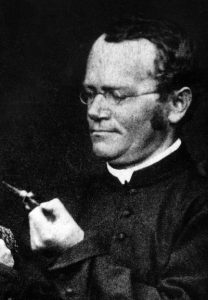 Continues to dismantle racism and evolution, one molecule at a time.
Continues to dismantle racism and evolution, one molecule at a time.
Since the genetic differences between people groups have no scientific basis, questionnaires requiring individuals to classify their race and ethnicity should be unacceptable in the twenty-first century.
The Genesis record, by contrast, continues to be compatible with the evidence in biological and physical sciences. According to the account written by Moses, all humans are of one race, in the lineage of Adam and Eve. Moses married a Cushite, an Ethiopian. Cush means “black.”
Gregor Mendel (pictured right), a German-speaking scientist from Moravian-Silesia, conducted experiments with pea plants that uncovered many of the rules of heredity during the Scientific Revolution. These rules are now known as the laws of Mendelian inheritance.
“The seed of supernatural life, of sanctifying grace, cleanses from sin, so preparing the soul of man, and man must seek to preserve this life by his good works.”
Charles Darwin Legitimized Racism is a Theory and Consensus article.
Darwin Then and Now is an educational resource on the intersection of evolution and science, highlighting the ongoing challenges to the theory of evolution.
Move On
Explore how to understand twenty-first-century concepts of evolution further using the following links –
-
- The Understanding Evolution category showcases how varying historical study approaches to evolution have led to varying conclusions. Subcategories include –
- Studying Evolution explains how key evolution terms and concepts have changed since the 1958 publication of The Origin of Species.
- What is Science explains Charles Darwin’s approach to science and how modern science approaches can be applied for different investigative purposes.
- Evolution and Science feature study articles on how scientific evidence influences the current understanding of evolution.
- Theory and Consensus feature articles on the historical timelines of the theory and Natural Selection.
- The Biography of Charles Darwin category showcases relevant aspects of his life.
- The Glossary defines terms used in studying the theory of biological evolution.
- The Understanding Evolution category showcases how varying historical study approaches to evolution have led to varying conclusions. Subcategories include –
2020 Update
WIKIPEDIA includes a page entitled “Racism.” The section entitled “Scientific Racism” reinforces the argument presented. See bold and underlined text.
The modern biological definition of race developed in the 19th century with scientific racist theories. The term scientific racism refers to the use of science to justify and support racist beliefs, which goes back to the early 18th century. However, it gained most of its influence in the mid-19th century, during the period of New Imperialism. Also known as academic racism, such theories initially had to overcome the Church’s resistance to positivist accounts of history and its support of monogenism, the concept that all human beings originated from the same ancestors, in line with creationist accounts of history.
These racist theories put forth on scientific hypotheses were combined with unilineal theories of social progress, which postulated the superiority of European civilization over the rest of the world. Furthermore, they frequently employed the concept of “survival of the fittest,” a term coined by Herbert Spencer in 1864, which is associated with ideas of competition and was later referred to as social Darwinism in the 1940s. Charles Darwin himself opposed the idea of rigid racial differences in The Descent of Man (1871), in which he argued that humans were all of one species, sharing common descent. He recognized racial differences as varieties of humanity. He emphasized the close similarities between people of all races in mental faculties, tastes, dispositions, and habits, while still contrasting the culture of the “lowest savages” with European civilization.
At the end of the 19th century, proponents of scientific racism intertwined themselves with eugenics discourses of “degeneration of the race” and “blood heredity”. Henceforth, scientific racist discourses could be defined as the combination of polygenism, unilinealism, social Darwinism, and eugenism. They found their scientific legitimacy in physical anthropology, anthropometry, craniometry, phrenology, physiognomy, and other now discredited disciplines to formulate racist prejudices.
Before being disqualified in the 20th century by the American school of cultural anthropology (Franz Boas, etc.), the British school of social anthropology (Bronisław Malinowski, Alfred Radcliffe-Brown, etc.), the French school of ethnology (Claude Lévi-Strauss, etc.), as well as the discovery of the neo-Darwinian synthesis, such sciences, in particular anthropometry, were used to deduce behaviours and psychological characteristics from outward, physical appearances.
The neo-Darwinian synthesis, first developed in the 1930s, eventually led to a gene-centered view of evolution in the 1960s. According to the Human Genome Project, the most complete mapping of human DNA to date indicates that there is no clear genetic basis for racial groups. While some genes are more common in specific populations, there are no genes that exist in all members of one population and no members of any other.
Evolution 101 in ” Is Evolution Racist? (2006) page, the summary notes –
“As a scientific theory, evolution makes no proscriptive moral statement…. So no, evolution is not racist- but I have to wonder at those people who seek to characterize it as such- isn’t there any good scientific criticism they can use? I guess not.”
[Evolution 101, apparently, is not aware of the Eugenics movements in Europe during the twentieth century.
Smithsonian Institute in “The Disturbing Resilience of Scientific Racism,” concludes –
“Like many geneticists, Saini argues that since race is a social construct, it doesn’t belong in genetics research.”
The theory of evolution has been in a state of crisis in science for decades. In 2016, the Society hosted the largest gathering of the world’s leading evolutionary scientists to address the situation. According to the Society –
“Developments in evolutionary biology and adjacent fields have produced calls for revision of the standard theory of evolution, although the issues involved remain hotly contested.”
Following the meeting, the issues remained “hotly contested,” leaving the theory still in crisis.
At the Royal Society in Great Britain on 31 May 2019, Perry Marshall and investor Kevin Ham announced the $10 Million Evolution 2.0 Prize. Oxford Professor Denis Noble FRS CBE hosted the meeting, and Oxford Professor Paul Flather, President of the Forum for Philosophy at the London School of Economics.
Denis organized the revolutionary “New Trends in Evolutionary Biology” conference, also at the Royal Society, in 2016 (see above).
Where did life come from? Where did the genetic code come from? The Evolution 2.0 Prize incentivizes the first person who can discover how code can emerge from chemistry. Such a discovery will bridge the gap between physics and biology.
Origin of Information (“Abiogenesis”) is the crucial question in the Origin of Life. It’s also central to evolutionary change. It is the most elemental scientific problem that can be precisely defined. A solution may be as revolutionary as Einstein’s theory of relativity or the development of the transistor.
-
- Prize entries are being accepted at www.herox.com/evolution2.0.
- Voices From Oxford official prize announcement page
Refer to the Glossary for the definition of terms.


